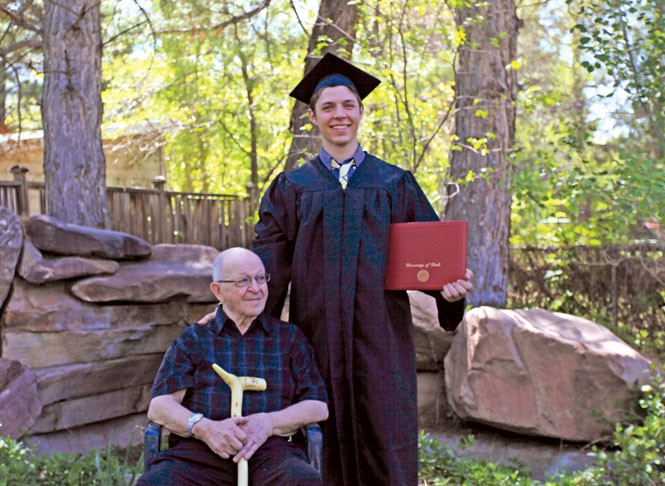Framing Dementia
Student-produced book tells stories of those close to Alzheimer's disease
By Rachel Piper @racheltachelSoon-to-be medical student Nicholas Shifrar (pictured above with his grandfather) graduated recently from the University of Utah with a major in psychology and a minor in biology. As part of a year-long class, Shifrar—whose long-term career goal is combining medicine and philosophy—and other students learned about Alzheimer's disease and created a book, called Framing Dementia, with stories collected from those close to disease, including doctors, family members and patients themselves. Copies of the book are available for $5 at the Center for Alzheimer's Care, Imaging & Research (650 Komas Drive, Salt Lake City, Suite 106-A) by calling ahead to 801-585-6546.
What got you interested in medicine?
I would say that my main hobby outside of school was poetry. A few friends of mine and I started a poetry club, which became a performance poetry club, and we went to a couple of national competitions. I loved it and would not trade these experiences for the world. But over the course of these five years, I really looked deep into my core, and I would say that I want to become a philosopher and a healer—one who loves beauty, truth and wisdom, and uses it to create a better world.
How did you start studying dementia?
I want to go into behavioral neurology. I'm always seeking to balance the scientific and the analytical side of my mind and spirit, but also my human side. I play music, I write music, I love poetry and literature. I'm always trying to blend these things as I move forward. The honors college offers think tanks, which are incredible opportunities for students to engage in things they are passionate about, while also accenting their own skills. It's an interdisciplinary course, and I was attracted to it because it was on Alzheimer's disease and aging, which is a medical-related issue—that's where my career is headed—but one of the professors was a musician, storyteller and composer, Phillip Bimstein; another was Dr. Vicky Newman. She is a literature professor and a writer, wife of the dean of the College of Humanities; and the third was Dr. Norman Foster, a neurologist. So this was like the blend of people that I want to be.
What was the process of making the book?
The first semester of the think tank, we had guest presenters come in from "the real world" and tell us about the problem, and what they face. We learned about the issue from all of these different perspectives. And then in the second semester, we started brainstorming—"OK, we are 10 students. What are our skills, what are our passions, and what can we really do to help this community of people affected by neurodegenerative diseases?" We traveled all around the valley, and our goal was to collect stories so that we could honor these people's lives. I interviewed a neurologist who was married to someone who was quite a bit older than she was and had Alzheimer's disease, an academic cardiologist who's also a musician, and a first-year medical student whose grandmother had Alzheimer's.
What do you want people to get out of this project?
We had a goal as a class to examine what stigma is. One of my stories, from the medical student, was about prejudgment that happens as people approach someone who has Alzheimer's disease. They might think, "Oh, none of them is left, they're just a shell of this former person." There is a truth, a brutal reality, to the disease, but there is also hope. This person retains selfhood.
There's this mark of fear or shame on elders. In Disney movies in particularly, the old person is oftentimes the warlock or the witch, cackling and throwing things into a pot. But most of us will be old at some point. Are we scary people now? That is us, in the future. It's our responsibility to connect with our elders, and care for them. It's heritage, it's ancestry. Start with your family; innately, we have that connection with our family. And if you know of a senior-living center, go there and introduce yourself.
More by Rachel Piper
-
The Big Read
Debbie Ehrman and Tommy Hamby on the shared reading experience
- Feb 4, 2015
-
Brooke Young of the Printz Award Committee
Awarding excellent books for young adults
- Jan 28, 2015
-
Linda Strasburg: InterViews & InterActions
Utah's longest-running female radio personality
- Jan 21, 2015
- More »





